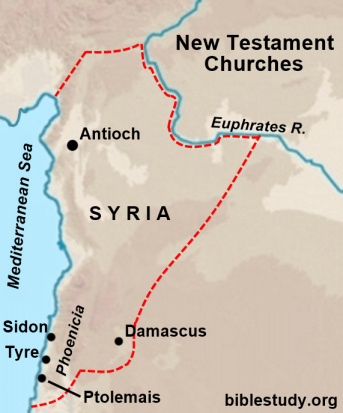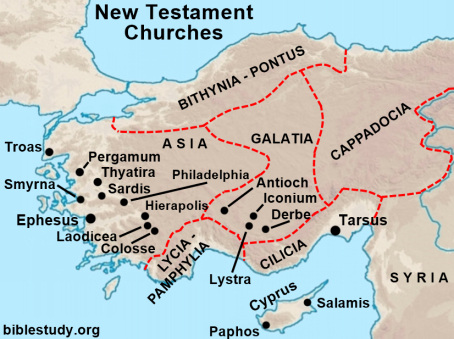Antioch in Syria was considered the third most important city in the Roman Empire behind Rome and Alexandria. Correspondingly, it was one of the major focal points for the early spread of Christianity after the initial birth of the New Testament church in Jerusalem.
The city is also one of the few places the Apostle Paul stayed in for more than a few weeks or months. During his thirty-five year ministry (33 to 68 A.D.), he resides in Antioch Syria a total of roughly five years.
Persecution and Blessing
Early New Testament believers, after the martyrdom of Stephen in 32 A.D., experienced a wave of persecution for their beliefs. In order to escape this oppression they migrated to several cities including Antioch. Once in the city these early Christians spread the gospel to both Jews and Gentiles.

God's blessing upon their efforts quickly leads to a large collection of believers requiring help to continue their spiritual growth. The Jerusalem church, recognizing the need, quickly sends Barnabas to Antioch. As the number of believers continues to increase Barnabas elicits the aid of Paul to ease the burden of teaching the new Gentile converts.
But certain men among them who were Cypriots and Cyrenians came to Antioch and spoke to the Greeks, preaching the gospel of the Lord Jesus. And the hand of the Lord was with them, and a great number believed and turned to the Lord . . .
Then Barnabas went to Tarsus to seek Saul. And after finding him, he brought him to Antioch. And it came to pass that for a whole year they assembled together with the church and taught a great multitude (Acts 11:20 - 21, 25 - 26).

The city would grow to become the cradle of Gentile Christianity in the first century. Paul and Barnabas were not only ordained apostles by the local church (Acts 13:1 - 3), it was from the city that Paul began his first three missionary journeys.
Antioch (Pisidia)
The Pisidia region, found within the southern portion of the province of Galatia, was known in the first century as an unsafe part of the Roman Empire in which to travel. Paul, when writing to the Corinthians regarding how much he had endured as a servant of God, writes that he was at times "in perils of robbers" (2Corinthians 11:26) while serving the churches.
Conybeare and Howson's excellent book on the life of Paul states the following regarding Antioch and its surrounding area.
"The lawless and marauding habits of the population of those mountains (in Eastern Asia Minor) . . . were notorious in all parts of ancient history . . . No population through the midst of which Apostle Paul ever traveled, abounded more in those "perils of robbers," of which he himself speaks, than the wild and lawless clans of the Pisidian Highlanders (The Life and Epistles of Apostle Paul, Chapter 6).
This city of Pisidia is the only place recorded in the New Testament where women (upper-class women in particular) are specifically mentioned as fully participating in the persecution of Christians (Acts 13:50).
The church in Antioch was started by the Apostle Paul. He first evangelized the city sometime in 45 A.D. (Acts 13:14), then came back to it a few months later (Acts 14:21), visited it again in 50 A.D. (Acts 16:6), then one last time in 53 A.D. (Acts 18:23).